Fables And Folk Tales Questions and Answers - Free PDF Download
NCERT Solutions for Class 6 English Poorvi, Chapter 1: Fables and Folk Tales includes two captivating stories: "A Bottle of Dew" and "Rama to the Rescue," along with a thought-provoking poem, "The Raven and the Fox." Each story is a delightful fable or folk tale with important lessons and charming characters. "A Bottle of Dew" teaches us that hard work is more valuable than magic, as Rama Natha learns through his efforts in growing bananas. "The Raven and the Fox" shows the danger of being tricked by flattery, illustrated by the clever fox and the proud raven. "Rama to the Rescue" highlights how clever thinking and bravery can protect against danger, as Rama and his wife outsmart a thief. With Class 6 English (Poorvi) NCERT Solutions, learning becomes more enjoyable and effective, helping students understand fables and folk tales.
 Table of Content
Table of ContentDownload the FREE PDF for Class 6 English Chapter 1 Question Answers, prepared by experts at Vedantu and updated according to the latest CBSE Class 6 English Syllabus, to make study sessions more productive and efficient.
Glance on Class 6 English (Poorvi) Chapter 1
Unit 1 of Class 6 English Poorvi features two interesting stories and one poem:
"A Bottle of Dew": This story is about Rama Natha, who learns that working hard is better than looking for magic. By growing bananas, he finds real success.
"The Raven and the Fox": In this poem, a raven is tricked by a fox's flattery and drops a piece of food. The story teaches us to be careful about being flattered.
"Rama to the Rescue": This story shows how cleverness and bravery help Rama and his wife catch a thief and keep their home safe.
These stories are fun and teach us important lessons about working hard, being smart, and being brave.
Access NCERT Solutions for Class 6 English Chapter 1
A Bottle of Dew
Let us do these activities before we read.
1. Circle the picture that matches with each word. Check your answers by sharing them with your classmates and teacher
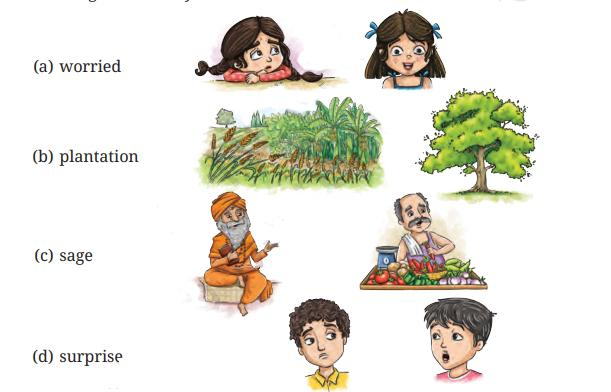
Ans:
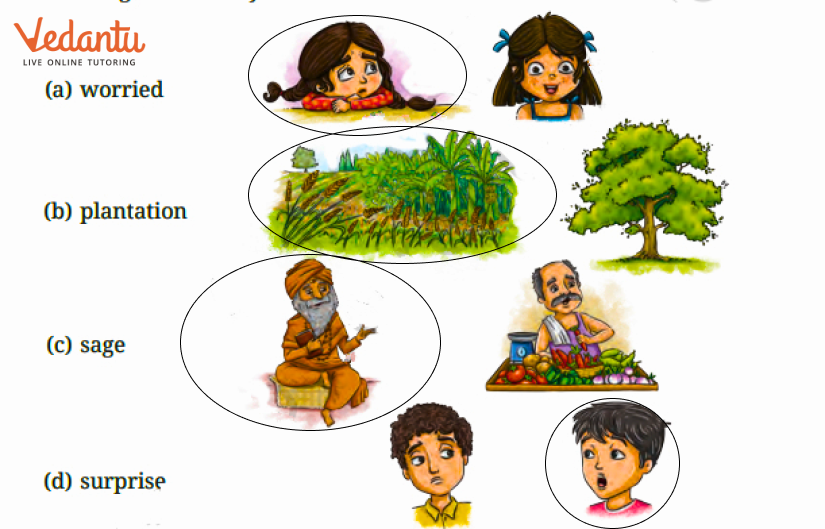
2. Answer these questions and discuss them with your classmates and teacher.
(a) Think of a time when you worked hard. What did you do then?
Ans: Last month, I worked hard on a drawing for art class. I spent a lot of time sketching, colouring, and adding details to make it look nice.
(b) How did it help you?
Ans: Working hard on my drawing helped me improve my art skills. My teacher and friends liked it, and I learned how to be more careful and patient while drawing.
(c) How did it make you feel?
Ans: Working hard on my drawing made me feel happy and proud. I was excited to see the final result and felt good about doing a great job.
Let us discuss
1. What did Rama Natha believe?
Ans: Rama Natha believed that he could find a magic potion that would turn objects into gold. He thought that this magic would make him rich and solve all his problems.
2. How did the sage help Rama Natha?
Ans: The sage, Mahipati, helped Rama Natha by giving him specific advice. He told Rama Natha to collect five litres of dew from banana plants. This advice guided Rama Natha to work hard and create a banana plantation.
3. Do you think Rama Natha will be able to collect the dew? Give a reason.
Ans: Yes, Rama Natha will be able to collect the dew because he and his wife worked hard to grow a large banana plantation. They spent many years carefully growing the bananas, which suggests they will successfully collect the dew needed, even though the real lesson is that their hard work created their wealth, not the magic they were seeking.
4. Why was Rama Natha angry?
Ans: Rama Natha was initially angry because he was disappointed that the dew did not turn objects into gold as he had hoped. He felt frustrated after all his hard work seemed to lead to no magical results.
5. How did Rama Natha and Madhumati create wealth?
Ans: Rama Natha and Madhumati created wealth by working hard to grow a large banana plantation. They sold the bananas for profit over several years, which eventually led to their financial success. Their diligent work and smart use of resources helped them become wealthy.
Let us think and reflect
1. Read the following lines and answer the questions that follow.
(a) He spent all his time to learn about the magic potion. People cheated him often, promising to tell him about it, but he did not give up. His wife, Madhumati, was tired of this and also worried because she saw how much money Rama Natha was spending. She was sure that soon they would be without money.
(i) Complete the sentence with a suitable reason. Rama Natha did not ‘give up’ because _____________________.
Ans: Rama Natha did not ‘give up’ because he was determined to find the magic potion and believed it would make him rich, despite being cheated and spending a lot of money.
(ii) Read the column which shows ‘what happened’ and write the correct outcome in the next column.
What Happened | Outcome |
a. People promised to tell Rama Natha about the magic potion. | |
b. Rama Natha was spending a lot of money |
Ans:
What Happened | Outcome |
a. People promised to tell Rama Natha about the magic potion. | a. Rama Natha was often cheated and did not find the potion. |
b. Rama Natha was spending a lot of money. | b. Madhumati became worried that they would soon run out of money. |
(iii) Write whether the following statements are True or False.
a. Madhumati was troubled about what her husband did.
Ans: True
b. Rama Natha was very happy digging his fields.
Ans: False
c. The sage wanted to show the right path to Rama Natha.
Ans: True
(b) Carefully, he took the bottle to the sage. The sage smiled and muttered something over the water. Then he returned the bottle and said, “Try it out.” Rama Natha sprinkled a few drops on a copper vessel and waited for it to turn to gold. To his surprise nothing happened!
(i) Choose the option that lists the events given below in the correct order.
a. The sage smiled.
b. Rama Natha gave the bottle to the sage.
c. Rama Natha dropped a few drops of water on a copper vessel.
d. He said something in a low voice over the water.
e. Rama Natha waited to see if the magic worked.
1. a, e, d, b, c
2. b, a, d, c, e
3. c, d, a, b, e
4. a, d, b, e, c
Ans: The correct order is:
2. b, a, d, c, e
So, the sequence is: b. Rama Natha gave the bottle to the sage.
a. The sage smiled.
d. He said something in a low voice over the water.
c. Rama Natha dropped a few drops of water on a copper vessel.
e. Rama Natha waited to see if the magic worked.
(ii) Fill in the blank with the correct word from the lines given above.
Seeing that the plant had dried up, the gardener ___________ some water on it.
Ans: Seeing that the plant had dried up, the gardener sprinkled some water on it.
(iii) How might Rama Natha have felt when nothing happened to the copper vessel?
Ans: Rama Natha might have felt surprised, disappointed, and confused when nothing happened to the copper vessel. He likely expected the water to magically turn the copper into gold, so the lack of results would have been a big letdown for him.
2. Answer the following questions.
(a) What did the sage ask Rama Natha to do to make the magic potion?
Ans: The sage asked Rama Natha to collect five litres of dew from banana plants as the main ingredient to make the magic potion.
(b) Why did the sage ask Rama Natha to do everything himself?
Ans: The sage asked Rama Natha to do everything himself so that he would learn the value of hard work and dedication. By doing all the tasks on his own, Rama Natha would develop patience, and perseverance, and ultimately, realize that real success comes from hard work, not magic.
(c) How could Rama Natha have a big banana plantation after six years?
Ans: Rama Natha was able to have a big banana plantation after six years because he worked tirelessly with his wife, Madhumati, planting and caring for the banana plants. Over time, their hard work paid off, and the plantation grew large enough to produce and sell bananas, creating wealth for them.
(d) How did the sage make Rama Natha believe that there is no magic potion?
Ans: The sage made Rama Natha believe that there was no magic potion by instructing him to collect dew over six years, which indirectly led Rama Natha to build a successful banana plantation. When the dew didn’t turn the copper vessel into gold, the sage revealed that the real "magic" was the wealth they created through their hard work, not an actual potion. This lesson helped Rama Natha understand that there is no shortcut or magical way to wealth—only dedication and effort.
(e) Fill in the ‘before’ and ‘after’ table about Rama Natha.
What he did before meeting the sage | What he did after meeting the sage |
1. | 1. |
2. | 2. |
Ans:
What he did before meeting the sage | What he did after meeting the sage |
1. He spent all his time searching for a magic potion. | 1. He followed the sage's advice and planted banana trees. |
2. He wasted money on people who cheated him, promising to tell him about the potion. | 2. He worked hard with his wife to grow a large banana plantation and create wealth. |
1. Read the following words from the story
promised | spending | cheated | luck |
remember | huge | difficult | market |
Use the words correctly to complete the paragraph given below. There are two extra words in the box that you do not need.
There was a farmer who had a ________________ coconut plantation. He worked hard and did not depend on ________________. Every day was _______________ but he did not give up. One day, a man bought a bag of coconuts from him, and _________________ to pay him the money the next day. Days passed and the man did not pay him anything. The farmer felt __________________. About two months later, he met the same man and asked him about his money. The man said, “Oh! I had forgotten. Now, I ______________ buying coconuts from you.” And he paid the money
Ans: There was a farmer who had a huge coconut plantation. He worked hard and did not depend on luck. Every day was difficult but he did not give up. One day, a man bought a bag of coconuts from him and promised to pay him the money the next day. Days passed and the man did not pay him anything. The farmer felt cheated. About two months later, he met the same man and asked him about his money. The man said, “Oh! I had forgotten. Now, I remember buying coconuts from you.” And he paid the money.
2. Read the words from the story in Column A. Read the new words in Column B. Complete the meanings of the words given in Column B. Meanings of some words are given.
Column A | Column B | Meaning of words in Column B |
I | eye | |
your | you’re | short form of ‘you are’ |
dew | due | happening at some time in the future |
son | sun | |
one | won | past tense of win |
ate | eight | |
see | sea |
Ans:
Column A | Column B | Meaning of words in Column B |
I | eye | A part of the body used for seeing. |
your | you’re | Short form of 'you are.' |
dew | due | Happening at some time in the future. |
son | sun | The star at the centre of our solar system. |
one | won | Past tense of win. |
ate | eight | The number that comes after seven. |
see | sea | A large body of saltwater. |
3. Choose four pairs of homophones from the table above, and for each pair write a sentence that uses both homophones in the same sentence. Check your answers by sharing them with your teacher and classmates. An example has been given below:
I ate eight bananas for breakfast today.
Ans: Here are four pairs of homophones from the table above, each used in a sentence:
I / eye
I can see the bird with my eye.
Your / you’re
You’re going to lose your book if you’re not careful.
Son/sun
The farmer’s son worked in the field from sunrise until sunset.
See / sea
When you go to the beach, you can see the vast sea in front of you.
4. Match the phrases in Column A with the phrases in Column B. Use the connecting words given in the middle column to make meaningful sentences.
Column A | Connecting Words | Column B |
The children submitted their work (When?) | because | the bell rang |
He did not want to try rock climbing (Why?) | before | there was a traffic jam. |
The children ran towards the gate (When?) | as soon as | the deadline |
Nitin was late to school today (Why?) | as | of his fear of heights. |
Now, write the new sentences in your notebook
Ans:
The children submitted their work because the deadline was approaching.
He did not want to try rock climbing as he was afraid of heights.
The children ran towards the gate as soon as the bell rang.
Nitin was late to school today because there was a traffic jam.
Let us speak
2. Discuss the following questions with a partner. You may use the hints given in brackets while speaking.
(a) What does hard work mean to you? (It means … / It is something … / Well, you see … /What I mean is …)
Ans: Well, you see, hard work means putting in a lot of effort and time to achieve something. It is something that requires dedication and persistence. What I mean is, it’s about staying focused and working diligently even when things get tough.
(b) Give three reasons why you think hard work is important. (Firstly, I feel … because … / Secondly, I think … since … /Lastly, I believe … as … )
Ans: Firstly, I feel hard work is important because it helps you achieve your goals and dreams. Without effort, it’s hard to reach your targets. Secondly, I think hard work builds character and teaches valuable skills like discipline and perseverance. Since these qualities are crucial for personal growth, they’re a direct result of hard work. Lastly, I believe hard work brings a sense of accomplishment and satisfaction as you see the results of your efforts. This feeling of success can be very motivating.
(c) Share three ideas you would give to someone who needs to work hard. (To begin with, it is important that … /Next, you could … / Finally, I think you should … )
Ans: To begin with, it is important that you set clear goals and plan your work. This helps you stay focused and organized. Next, you could break your tasks into smaller, manageable steps. This makes the work less overwhelming and helps you track your progress. Finally, I think you should stay positive and persistent, even if you face challenges. Remember, consistent effort will eventually lead to success.
Let us write
1. Work in pairs to complete the description of a banana. You may take the help of the words given in brackets. Share your answers with your classmates and teacher.
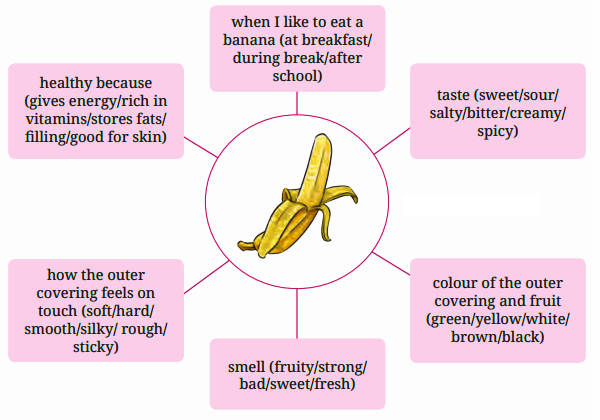
Ans: Eight sentences about a banana:
I like to eat a banana during break.
A banana tastes sweet.
The outer covering of the banana is yellow.
The fruit inside the banana is white.
The banana has a fruity smell.
The outer covering of the banana feels smooth to the touch.
A banana is rich in vitamins, making it a healthy choice.
Eating a banana during the day provides a quick and nutritious boost.
2. On the basis of the story ‘A Bottle of Dew’ develop a script with dialogues and enact it with expressions. Present it in the assembly or your classroom.
Ans:
Scene 1: Rama Natha’s Home
(Rama Natha and Madhumati are talking in their home.)
Madhumati: (looking worried) Rama Natha, you have been spending so much money and time looking for a magic potion. I fear we will soon run out of money!
Rama Natha: (determined) I know, Madhumati. But this potion will make us rich! I just need to find the right one.
Scene 2: Meeting the Sage
(Rama Natha is standing in front of Sage Mahipati, holding a bottle.)
Rama Natha: (excitedly) Sage Mahipati, I have brought this bottle of dew. Will it turn objects into gold?
Sage Mahipati: (smiling) Let me see. (He examines the bottle and mutters something over it.) Try it out.
Rama Natha: (sprinkles dew on a copper vessel and waits anxiously)
Sage Mahipati: (calmly) What do you see?
Rama Natha: (disappointed) Nothing has changed. The copper vessel is still the same!
Scene 3: Realization
(Rama Natha and Madhumati are working in their banana plantation.)
Madhumati: (cheerfully) Look at our banana plantation, Rama Natha! It has grown so large and fruitful.
Rama Natha: (thoughtfully) Yes, Madhumati. I understand now. The real magic was in our hard work, not in any potion.
Madhumati: (smiling) Yes, our hard work has brought us wealth.
Rama Natha: (with a smile) From now on, I will value hard work more than searching for magic.
Sage Mahipati: (appears briefly, smiling) Well done, Rama Natha. You have learned the true lesson.
Scene 4: Conclusion
(Rama Natha and Madhumati are happily looking at their plantation.)
Rama Natha: (to the audience) The lesson we learned is that hard work and dedication are the real keys to success. Magic cannot replace effort.
Madhumati: (to the audience) Always remember, working hard will bring its own rewards.
(All characters take a bow as the scene ends.)
Let us explore
Find out the varieties of bananas which are grown, cultivated and eaten in different parts of India.
Ans: India grows a diverse range of banana varieties, each suited to different regions and climates. Here are some popular varieties of bananas cultivated and eaten in different parts of India:
1. Assam
Kachkola: Known for its small size and green colour, often used in cooking.
Gros Michel: A large, sweet banana that is less common but valued for its taste.
2. Kerala
Nendran: A staple variety used in cooking, particularly in Kerala cuisine. It's larger, with a thicker skin and is often fried or made into chips.
Poovan: Known for its sweetness and aroma, it is consumed both raw and ripe.
3. Tamil Nadu
Sengapadavu (Red Banana): Characterized by its reddish-purple skin and sweet taste. It's often eaten raw or used in desserts.
Yelakki (Small Banana): A smaller, sweeter banana, popular for its rich flavor and used in various dishes.
4. Karnataka
Rasthali (Apple Banana): Small and sweet, resembling an apple in flavor. It’s often used in snacks and desserts.
Kadalebanana: Known for its distinct taste, it's consumed fresh or used in cooking.
5. Maharashtra
Bhagwa (Bhagwa Banana): Known for its bright yellow color and sweet taste. It’s widely consumed fresh.
Dwarf Cavendish: A small, sweet banana commonly found in Maharashtra.
THE RAVEN AND THE FOX
Let us do these activities before we read.
1. We know that frogs croak. Did you know that ravens also croak?
Ans: Yes, ravens also make a croaking sound, similar to frogs. Ravens have different types of calls, including deep, throaty croaks. They use these sounds to talk to each other, mark their territory, and attract mates.
2. Which animal is shown to be cunning in stories? Circle the correct answer.
(a) tiger (b) fox (c) bear
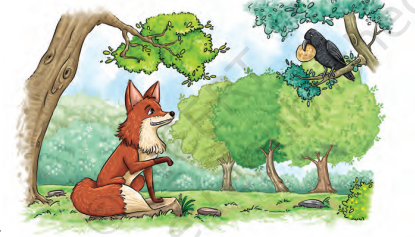
Ans: (b) Fox
Let us discuss
1. Fill in the blanks by choosing the correct option.
(a) Stanza 1
(i) Mr Raven is a __________. (bird/frog)
(ii) The name of the fox is __________. (Raven/Reynard)
(iii) Mr Raven had __________ in his beak. (a piece of food/ a bunch of leaves)
(b) Stanza 2
(i) The Fox calls the Raven a __________ bird. (foolish/good-looking)
(ii) The Fox asks the Raven to __________. (dance/sing)
(iii) The Raven and the Fox live in the __________. (trees/woods)
(c) Stanza 3
(i) The Raven ___________ that he croaked. (remembered/forgot)
(ii) The Raven opened its beak to ___________. (eat/sing)
(iii) The ___________ fell down. (food/Raven)
(d) Stanza 4
(i) The Fox ___________ at the Raven. (laughed/looked)
(ii) It is not ___________ to be too proud of oneself. (wise/unwise)
(iii) The Raven learnt a ______________. (lesson/teaching)
Ans:
(a) Stanza 1
(i) Mr Raven is a bird.
(ii) The name of the fox is Reynard.
(iii) Mr Raven had a piece of food in his beak.
(b) Stanza 2
(i) The Fox calls the Raven a good-looking bird.
(ii) The Fox asks the Raven to sing.
(iii) The Raven and the Fox live in the woods.
(c) Stanza 3
(i) The Raven forgot that he croaked.
(ii) The Raven opened its beak to sing.
(iii) The food fell down.
(d) Stanza 4
(i) The Fox laughed at the Raven.
(ii) It is not wise to be too proud of oneself.
(iii) The Raven learnt a lesson.
2. Read the poem again and match the words in Column A with their meanings in Column B. Check your answers with your teacher and your classmates.
Column A | Column B |
1. perched | (a) a small piece of food |
2. morsel | (b) looked with interest at something |
3. seek | (c) feeling that you are better than others |
4. pride | (d) sat on a branch |
5. eyed | (e) to look for something |
6. limb | (f) a smaller area of forest with similar kinds of trees |
7. woods | (g) branch of a tree |
Ans:
perched - (d) sat on a branch
morsel - (a) a small piece of food
seek - (e) to look for something
pride - (c) feeling that you are better than others
eyed - (b) looked with interest at something
limb - (g) branch of a tree
woods - (f) a smaller area of forest with similar kind of trees
Let us think and reflect
1. Look at the pictures and number them in the order that they happen in the poem
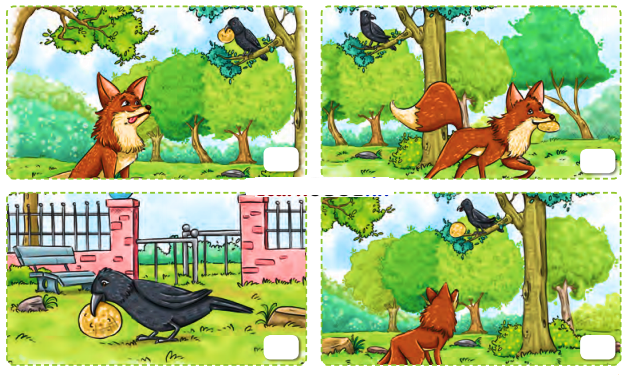
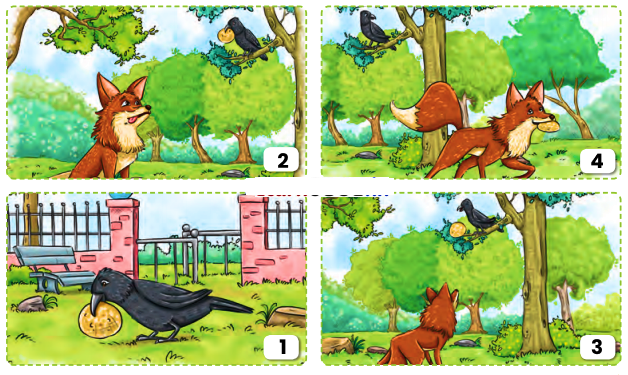
2. Read the following lines and answer the questions that follow.
(a) Sir Raven, you are a handsome bird.
Such feathers! If you would only sing,
The birds of these woods would call you King.
(i) ‘Such feathers’ refer to __________________ feathers.
a. shiny and beautiful
b. black and dull
c. grey and long
d. short and unattractive
(ii) Why would the birds of the woods call the Raven ‘King’?
(iii) Why does the Fox address the Raven as ‘Sir’?
Ans: (i) ‘Such feathers’ refer to a. shiny and beautiful feathers.
(ii) The birds of the woods would call the Raven ‘King’ if he sang well because the Fox is flattering to the Raven, suggesting that his singing would make him the most admired and honoured bird in the woods.
(iii) The Fox addresses the Raven as ‘Sir’ to flatter him and make him feel important, which is part of the Fox’s trick to get the Raven to sing.
(b) The Raven, who did not see the joke,
Forgot that his voice was just a croak.
He opened his beak, in his foolish pride–
(i) Why did the Raven open his beak?
(ii) Complete the following with one word from the given lines.
Fox: clever:: Raven: ______________
Ans: (i) The Raven opened his beak to sing, believing the Fox’s praise and wanting to show off.
(ii) Fox: clever: : Raven: foolish
3. Why does the Raven forget that his voice is just a croak?
Ans: The Raven forgets that his voice is just a croak because he is flattered by Fox’s praise and becomes too proud, thinking he can sing well.
4. How does Reynard make the Raven sing?
Ans: Reynard makes the Raven sing by flattering him and praising his appearance, which leads the Raven to open his beak and sing.
5. Why does Reynard say that pride is not wise?
Ans: Reynard says that pride is not wise because it can lead to foolish actions. The Raven's pride made him ignore the reality of his singing ability, resulting in embarrassment.
6. Give one reason why the teaching is quite a surprise.
Ans: The teaching is quite a surprise because the Raven, despite being clever and knowing he croaks, falls for Fox’s flattery and ends up losing his food. The lesson shows how easily pride and vanity can lead to foolish mistakes.
7. Imagine someone praises you too much. How would you react?
Ans: If someone praises me too much, I would try to stay humble and not let it affect my actions. I’d remind myself to be cautious and aware of my true abilities to avoid making mistakes due to overconfidence.
Let us learn
1. Write the rhyming words from the poem. One has been done for you.
Stanza 1 (a) limb-him (b)______ ______ |
Stanza 2 (a) word-______ (b)______ ______ |
Stanza 3 (a) joke-______ (b)______ ______ |
Stanza 4 (a) know-______ (b)______ ______ |
Ans:
Stanza 1
(a) limb - him
(b) King - sing
Stanza 2
(a) word - bird
(b) woods - good
Stanza 3
(a) joke - croak
(b) pride - side
Stanza 4
(a) know - show
(b) wise - surprise
2. Study the underlined words in the poem.
(a) For the Raven held in his great big beak.
The words ‘big’ and ‘beak’ begin with the same /b/ sound.
(b) The song of sweet birds.
Now, pick another example of alliteration from Stanza 2.
Ans: In Stanza 2, another example of alliteration is "sly fox."
3. Choose the correct opposites from the box given below and complete the table. There are two extra words that you will not need.
wise | happy | humility | flew |
remembered | notice | dim | cried |
silly | |||
Words | Opposites |
1. perched | |
2. forgot | |
3. foolish | |
4. pride | |
5. laughed | |
6. ignore | |
7. glow |
Use any four words from the table given above to make sentences of your own
Ans:
Words | Opposites |
1. perched | flew |
2. forgot | remembered |
3. foolish | wise |
4. pride | humility |
5. laughed | cried |
6. ignore | notice |
7. glow | dim |
Sentences:
The bird flew away from its perch in the tree.
She remembered to bring her homework after she had forgotten it yesterday.
He acted wise when he listened to advice rather than making a foolish decision.
His humility was evident when he accepted the praise without showing any pride.
Let us speak
Narrate the poem in the form of a story. Give a different ending to the story. You may begin like this:
This is a story about a clever fox named Reynard and Mr Raven. One day…
Ans: This is a story about a clever fox named Reynard and Mr. Raven. One day, Mr. Raven was sitting on a tree branch, enjoying a piece of food in his beak. Reynard, who was passing by, saw the food and wanted it for himself.
He decided to flatter Mr. Raven by saying, “Oh, Mr. Raven, you are such a beautiful bird. If you sing, all the birds will call you King!” Mr. Raven, pleased by the compliment, thought about how great it would be to be admired by everyone. He opened his beak to sing, and the food fell out.
But in this new ending, as Mr. Raven was about to sing, he noticed some birds flying towards them. These birds had heard Reynard’s flattery and came to see what was happening. They saw Reynard trying to steal the food and quickly stopped him.
The birds asked Reynard to return the food to Mr. Raven. Reynard, embarrassed and caught in his trick, gave the food back. Mr. Raven thanked the birds and learned that being true to himself was more important than seeking false praise. Reynard learned that being honest and friendly was better than using tricks.
Let us write
Now, write the story you narrated in the form of a conversation.
(Remember to write only the actions for the Raven as he has food in his mouth and does not speak.)
You may begin like this.
Reynard: Good morning, Mr Raven! You seem to be awake so early! (Mr Raven just nods his head)
Reynard: Oh, Mr Raven, you look …
Ans: Reynard: Good morning, Mr. Raven! You seem to be awake so early!
(Mr. Raven just nods his head, holding a piece of food in his beak.)
Reynard: Oh, Mr. Raven, you look so handsome today! Just look at those beautiful feathers of yours.
(Mr. Raven fluffs his feathers a little, clearly pleased with the praise.)
Reynard: If you sang a song, I’m sure all the birds in the woods would call you King!
(Mr. Raven’s eyes widen with excitement, and he begins to think about how wonderful it would be to be admired by everyone.)
Reynard: Why don’t you try singing? I’m sure everyone would be impressed!
(Mr. Raven opens his beak, ready to sing. As he does, the piece of food falls out.)
Reynard: Oh, what a wonderful song you’re about to sing!
(Suddenly, a group of birds flies towards them, having heard Reynard’s flattery.)
Bird 1: Hey! What’s going on here?
Bird 2: Reynard, is that you trying to trick Mr. Raven?
Bird 3: Give that food back to Mr. Raven!
(Reynard looks surprised and embarrassed as the birds confront him.)
Reynard: Uh, alright, I’m sorry. Here’s the food back.
(Reynard hands the food back to Mr. Raven. Mr. Raven looks grateful and the birds fly away.)
Reynard: I’ve learned my lesson. Being honest and friendly is better than tricking others.
(Mr. Raven nods in agreement, and they both go their separate ways, having learned a valuable lesson about honesty and friendship.)
RAMA TO THE RESCUE
Let us do these activities before we read.
1. Identify the following people. How do they help us when we are in trouble?

Ans:
Police Officers: They help us by keeping us safe from crime, protecting us during emergencies, and helping with investigations.
Doctors: They help us by treating illnesses and injuries, providing medical care, and offering advice for maintaining health.
Firefighters: They help us by putting out fires and rescuing people who are trapped in dangerous situations.
2. Choose the correct option to complete the sentence.
The word ‘rescue’ means to ______________________.
(a) make fun of someone
(b) save someone
(c) ask someone for help
Ans: (b) save someone
3. Work in pairs. Put a tick mark at the end of the phrases describing those who need to be rescued. Share your answers with your teacher and classmates.
(a) A man stuck in a building on fire.
(b) A woman buying vegetables in the market.
(c) A dog who has hurt its leg.
(d) A tree being cut down in a forest.
Ans:
(a) A man stuck in a building on fire. ✅
(b) A woman buying vegetables in the market.
(c) A dog who has hurt its leg. ✅
(d) A tree being cut down in a forest. ✅
4. The policeman in the story you are about to read is called the Kotwal. Some people call him thaanedar. What do you call a policeman in your language? Share it with your classmates and teacher. Share your local term with your classmates and teacher.
Ans: In Hindi, a policeman is commonly called " पुलिसवाला" (Policewala) or " थानेदार" (Thaanedar).
In other languages, it might have different names. For example:
In Tamil: " காவலர்" (Kaavalaar)
In Telugu: " పోలీసు" (Police)
In Kannada: " ಪೊಲೀಸ್" (Police)
In Bengali: " পুলিশ" (Police)
5. Imagine you are alone at home and you face a problem. Answer the following questions and share your answers with your teacher and classmates.
(a) Will you solve the problem yourself or wait for someone to help you?
Ans I would try to solve the problem myself first, but if I cannot solve it, I would wait for someone to help me.
(b) How will you deal with the problem? Give a reason.
(i) Be worried about the problem and give up.
Ans: This may not be helpful because worrying alone won’t solve the problem. It is better to think of possible solutions.
(ii) Feel angry that only you have the problem.
Ans: Feeling angry will not help in solving the problem. It is better to focus on finding a solution instead of getting angry.
(iii) Think quickly about ways to solve the problem.
Ans: Thinking quickly about ways to solve the problem is the best approach. It helps in finding a solution and dealing with the issue effectively.
Let us discuss
1. Work in pairs to match the words in Column A with the meanings in Column B. Check your answers by sharing them with your teacher and classmates.
Column A | Column B |
1. wonder | (f) a feeling of surprise |
2. yard | (c) an area outside a building |
3. chatter | (d) talk for a long time about unimportant things |
4. instead | (a) in place of someone or something |
5. closely | (b) carefully |
6. perhaps | (e) maybe |
Ans:
wonder - (f) a feeling of surprise
yard - (c) an area outside a building
chatter - (d) talk for a long time about unimportant things
instead - (a) in place of someone or something
closely - (b) carefully
perhaps - (e) maybe
2. Fill in the boxes with suitable words as you read the story.
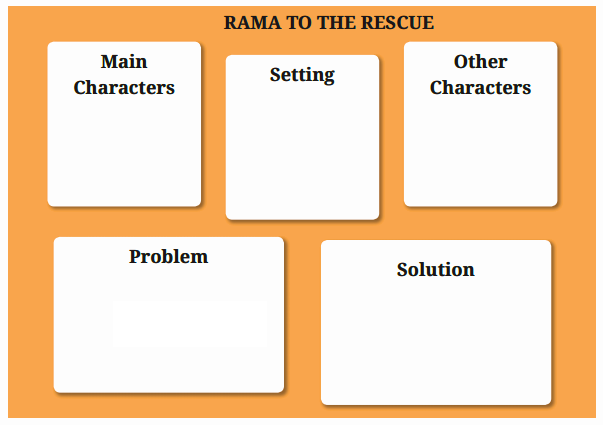
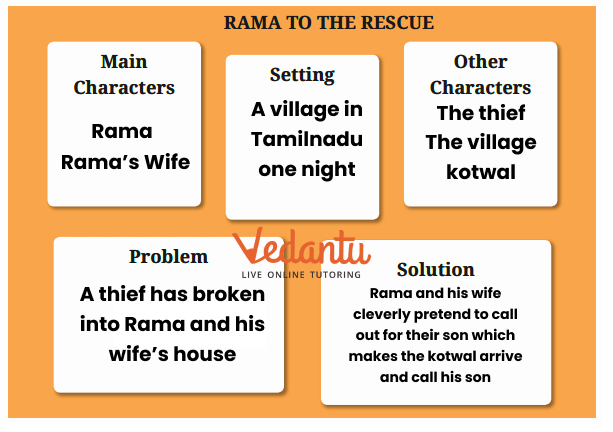
Let us think and reflect
1. Read the following lines and then answer the questions that follow.
(a) Man: What’s the matter? What are you looking at?
Wife: Ssssh! Listen!
Man: Somebody is trying to get in.
Wife: I … I think he has got in … the noise has stopped.
(i) What makes the man say the first line?
Ans: The man says the first line because he hears something unusual or suspicious and wants to know what is happening.
(ii) Choose the correct option.
The wife says ‘Ssssh! Listen!’. What does the word ‘Ssssh’ mean here?
a. sleep
b. help
c. rest
d. be silent
Ans: d. be silent
(iii) How can you tell that the wife was listening carefully?
Ans: You can tell that the wife was listening carefully because she tells the man to be silent with "Ssssh! Listen!" and then she comments on the noise stopping, indicating she was paying close attention to the sounds.
(b) Rama, the village Kotwal, ran to the house from which he heard his name being called.
Rama: Oh, Oh! Some thief has dug his way into this house.
(i) Fill in the blank with the correct word from the given lines. The villagers caught the thief and took him to the _____________________.
Ans: The villagers caught the thief and took him to the police station.
(ii) Choose the correct option.
What do the words “Oh, Oh!” show here?
a. surprise
b. anger
c. pain
d. happiness
Ans: a. surprise
(iii) How can you tell that the kotwal was good at his job?
Ans: You can tell that the kotwal was good at his job because he quickly ran to the house upon hearing his name being called and was able to identify that a thief had broken in.
2. Give one reason why the man and his wife were not able to fall asleep.
Ans: The man and his wife were not able to fall asleep because they were worried and disturbed by the noise of the thief trying to break into their house.
3. What did the thief wish would happen? Did it happen?
Ans: The thief wished that the man and his wife would discuss where their money was kept. This did not happen; instead, the man and his wife cleverly created a diversion by discussing their future child’s name, which led to the thief becoming frustrated and making mistakes.
4. How did the man and his wife get help from the Kotwal?
Ans: The man and his wife got help from the kotwal by cleverly calling out his name in different volumes, which alerted him to the presence of the thief. This allowed the kotwal to arrive, understand the situation, and arrest the thief.
5. Do you think cleverness can help us solve our problems? Why do you say so?
Ans: Yes, cleverness can help us solve our problems. Cleverness often involves thinking creatively and finding smart solutions, as shown in how the man and his wife used their clever plan to deal with the thief and prevent the robbery.
Let us learn
1. Study the highlighted words in the following lines.
I’m feeling so sleepy…
It’s a thief.
They’re awake.
The highlighted words given in the above sentences have one letter missing in each. What are they? Share them with your teacher and classmates.
Now, write the full words with the missing letter.
(a) _________ feeling so sleepy…
(b) _________ a thief.
(c) _____ awake.
Ans: Here are the full words with the missing letters:
(a) I’m feeling so sleepy…
(b) It’s a thief.
(c) They’re awake.
2. Expand the following words. Two examples have been done for you. Use the contracted form of these words in sentences of your own.
S. No | Contracted Words | Expanded Form | Sentences |
(a) | what's | what is | |
(b) | I'll | I will | |
(c) | I'd | I would | |
(d) | we'll | we will | |
(e) | that's | that is | |
(f) | we're | we are | |
(g) | don't | do not | |
(h) | you'll | you will | |
(i) | must've | must have |
Ans:
S. No | Contracted Words | Expanded Form | Sentences |
(a) | what's | what is | What's the plan for today? What is the plan for today? |
(b) | I'll | I will | I'll finish my homework later. I will finish my homework later. |
(c) | I'd | I would | I'd like a cup of tea. I would like a cup of tea. |
(d) | we'll | we will | We'll go to the park tomorrow. We will go to the park tomorrow. |
(e) | that's | that is | That's a nice dress. That is a nice dress. |
(f) | we're | we are | We're having dinner at 7. We are having dinner at 7. |
(g) | don't | do not | Don't be late for school. Do not be late for school. |
(h) | you'll | you will | You'll enjoy the movie. You will enjoy the movie. |
(i) | must've | must have | She must've left already. She must have left already. |
3. Study the highlighted words and the words in the brackets in the following sentences from the story.
(a) I am feeling so sleepy. (am + feel + ing)
(b) What are you looking at? (are + look + ing)
(c) Somebody is trying to get in. (is + try + ing)
(d) They are saying something. (are + say + ing)
(e) Perhaps, they are talking about their money. (are + talk + ing)
Now, choose the correct option. The sentences (a)-(e) refer to actions that _________________.
(are going on at the time of speaking/happened in the past/will take place in the future)
Ans: The sentences (a)-(e) refer to actions that are going on at the time of speaking.
This is because they describe actions currently happening or ongoing at the moment of speaking, which is indicated by the present continuous tense formed by combining the verb "to be" (am, are, is) with the -ing form of the main verb (feeling, looking, trying, saying, talking).
4. Fill in the blanks to complete the following sentences.
(a) I ______________ in Grade 6. (am + study + ing)
(b) My friend ______________ a storybook. (is + read + ing)
(c) We ______________ a board game. (are + play + ing)
(d) I ______________ a new language. (am + learn + ing)
(e) The teachers ______________ in the staff room. (are + sit + ing)
(f) My mother ______________ food in the kitchen. (is + cook + ing)
Ans: Here are the sentences filled in correctly:
(a) I am studying in Grade 6. (am + study + ing)
(b) My friend is reading a story book. (is + read + ing)
(c) We are playing a board game. (are + play + ing)
(d) I am learning a new language. (am + learn + ing)
(e) The teachers are sitting in the staff room. (are + sit + ing)
(f) My mother is cooking food in the kitchen. (is + cook + ing)
5. Study the following picture and fill in the blanks with the present progressive form of verbs.
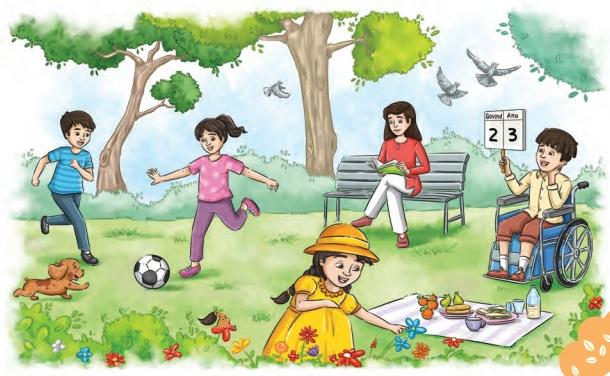
(a) Govind and Anu _____________ football.
(b) Pema ___________ flowers.
(c) Anil _____________ the scorecard.
(d) The mother ___________ a book.
(e) The dog __________ to catch the ball.
(f) The birds _________ in the sky.
Ans: (a) Govind and Anu are playing football.
(b) Pema is picking flowers.
(c) Anil is holding the score card.
(d) The mother is reading a book.
(e) The dog is running to catch the ball.
(f) The birds are flying in the sky.
6. Study the following sentences from the story and complete the table. One example has been done for you.
(a) I’d better listen closely.
(b) When he’s in the house, I’ll call out softly to him.
(c) Then I’ll call out very loudly…
S. No | Sentence | Question | Word |
1. | I'd better listen closely. | How does he listen? | a. closely |
2. | When he’s in the house, I’ll call out softly to him. | How does she call out? | b. |
3. | Then I’ll call out very loudly. | How does she call out? | c. |
Ans:
S. No | Sentence | Question | Word |
1. | I'd better listen closely. | How does he listen? | a. closely |
2. | When he’s in the house, I’ll call out softly to him. | How does she call out? | b. softly |
3. | Then I’ll call out very loudly. | How does she call out? | c. loudly |
7. Fill in the blanks with suitable adverbs from the box given below. There are two extra words that you do not need.
warmly | gracefully | smoothly |
beautifully | funnily | quickly |
hurriedly |
(a) He solved the mathematics problem _____________.
(b) The car moved _____________ along the highway.
(c) The musician played the guitar _____________.
(d) Shobha danced _____________.
(e) Rohit left the house _____________.
Ans: Here are the sentences filled in with suitable adverbs:
(a) He solved the mathematics problem quickly.
(b) The car moved smoothly along the highway.
(c) The musician played the guitar beautifully.
(d) Shobha danced gracefully.
(e) Rohit left the house hurriedly.
8. Fill in the blanks with suitable adverbs from the box given below. There are two extra words that you do not need.
honestly | brightly | peacefully |
sweetly | angrily | slowly |
tirelessly |
Once upon a time in a small forest, animals lived (i) ___________. The wise old tortoise moved (ii) ___________ but always won the race against the proud rabbit. The ants worked (iii) ___________, gathering food for the winter. The kind-hearted lion ruled the jungle (iv) ___________, giving everyone a chance to speak. The birds sang (v) ___________, making everyone in the forest happy.
Ans: Once upon a time in a small forest, animals lived (i) peacefully. The wise old tortoise moved (ii) slowly but always won the race against the proud rabbit. The ants worked (iii) tirelessly, gathering food for the winter. The kind-hearted lion ruled the jungle (iv) honestly, giving everyone a chance to speak. The birds sang (v) sweetly, making everyone in the forest happy.
9. Study the following sentences from the story and choose the correct option.
(i) Oh, hum! What a hard day it has been!
(ii) Ah, at last, they’ve stopped their chatter!
(iii) What should we do?
(iv) What should we name our child?
a. Sentence (i) expresses a feeling of __________. (tiredness/joy)
b. Sentence (ii) expresses a feeling of __________. (wonder/relief)
c. Sentences (iii) and (iv) ask __________. (answers /questions)
Ans: (a) Sentence (i) expresses a feeling of tiredness.
(b) Sentence (ii) expresses a feeling of relief.
(c) Sentences (iii) and (iv) ask questions.
10. Punctuate the following sentences and write whether they are exclamatory or interrogative sentences.
(a) Wow, what an intelligent man he is!
Ans: Exclamatory
(b) Oh, how big the hole is!
Ans: Exclamatory
(c) Do you like to read comic books?
Ans: Interrogative
(d) What is your favourite story?
Ans: Interrogative
Let us listen
You will listen to a security guard making an announcement to the people in the neighbourhood. As you listen, fill in the blanks with only one word that you hear. (refer to page 38 for transcript)
The security guard announced that (i) ____________ has been happening in that area. He advised everyone to stay safe and the kids to tell the (ii) ____________ as soon as they find anything different. They should not forget that (iii) ____________ is the main thing. He asked them to call (iv) ____________ when they need immediate help.
Ans:
(i) crime
(ii) authorities
(iii) safety
(iv) 911
Let us speak
2. Discuss in pairs:
(a) Why do you think it’s important for people to keep their house and themselves safe? Tick the suitable reasons.
(i) To be safe from injury
(ii) To keep family members and pets safe
(iii) To stop accidents from happening
(iv) To make sure they visit the doctor regularly
(v) To stop robbery
(vi) To pay the electricity bill
(vii) To save money
Ans: Here are the suitable reasons for keeping houses and oneself safe:
(i) To be safe from injury
(ii) To keep family members and pets safe
(iii) To stop accidents from happening
(v) To stop robbery
(b) Now, use the given hints to share your reasons in complete sentences with your teacher and classmates.
I think it’s important because ... /
I feel it’s necessary as ... /
The reason we need to look at safety is ...
Ans:
I think it’s important because keeping our house and ourselves safe helps prevent injuries and accidents.
I feel it’s necessary as it ensures that our family members and pets are protected from potential harm.
The reason we need to look at safety is to prevent theft and ensure that our belongings are secure.
(c) Use the given hints to share three ideas on how people can keep their houses and themselves safe. Share with your classmates and teachers.
I think they should … /
I suppose they could … /
They must … /
They should … /
How about … /
It might be better to …
Ans:
I think they should install security cameras around their property to monitor any unusual activity.
I suppose they could keep all doors and windows locked when they are not at home to prevent break-ins.
They must make sure to have a safety plan in case of emergencies, including fire drills and knowing the location of exits.
Let us write
The next day, the neighbour asked the man in the story about what had happened. As the man, tell the neighbour what had happened in your own words. Remember to include the following:
when ………….........………………………………………………….
where ………….........………………………………………………….
what ………….........………………………………………………….
how ………….........………………………………………………….
why ………….........………………………………………………….
You may begin this way: My wife and I were about to go to sleep last night when we heard someone …
Ans:
My wife and I were about to go to sleep last night when we heard someone trying to get into our house. It was around midnight, and we were in our bedroom. We were startled by the noise and became very concerned. We quickly realized that it was a thief trying to break in. I called for help, and luckily, the kotwal arrived just in time. We needed help because we were afraid for our safety and didn’t know what to do. Thanks to the prompt response, the thief was caught, and we were safe.
Let us explore
1. Find out from your teacher or parents what you would do in the following situations.
Who will you call if …
you see fire
you see someone getting hurt
you see a wounded animal
you see someone suspicious
you find a lost child
you get lost
Ans: Here’s a general guide for each situation:
If you see fire: Call the fire department or emergency services immediately. In India, you can dial 101 for the fire brigade.
If you see someone getting hurt: Call an ambulance or emergency services right away. In India, you can dial 108 for ambulance services.
If you see a wounded animal: Contact local animal shelters or veterinarians. In some areas, there may also be animal rescue organizations or hotlines.
If you see someone suspicious: Report the situation to the local police. In India, you can dial 100 for police assistance.
If you find a lost child: Contact the local police and inform them immediately. Additionally, you can notify nearby security personnel or community services.
If you get lost: Call a family member or friend for assistance. If you’re in a public place, seek help from security personnel or contact local authorities for assistance.
2. Find the right path for the kotwal to catch the thief
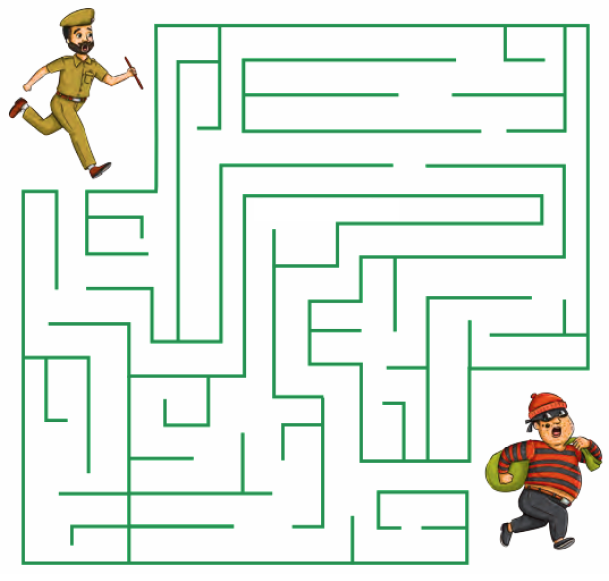
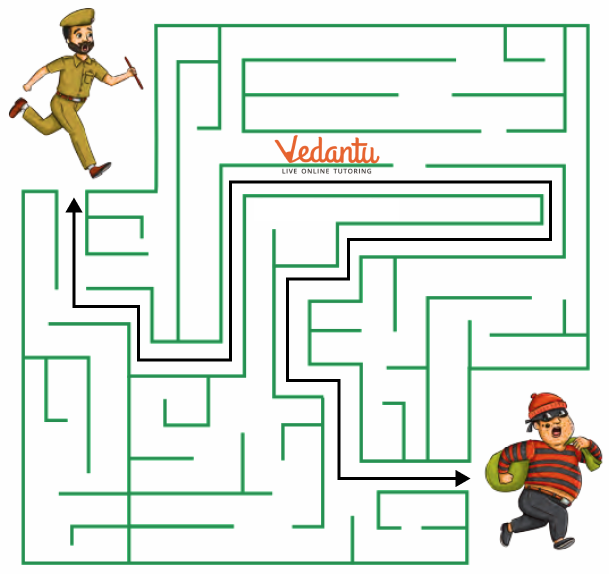
Benefits of NCERT Solutions for Class 6 English Chapter 1
NCERT Solutions for Class 6 English Chapter 1 helps students understand the story better by explaining difficult words and phrases.
They provide answers to questions about the chapter, helping students grasp the main ideas.
They show students the right way to answer questions, improving their writing skills.
They help students feel more confident in their reading and writing abilities.
They help improve language skills by providing examples of correct sentence structures and vocabulary usage.
Class 6 NCERT Solutions Chapter 1 clarifies any doubts about the story, making it easier for students to grasp the themes and messages.
Important Study Material for English Chapter 1 Class 6 -
S. No | Important Study Material Links for Chapter 1 |
1. | Class 6 Fables and Folk Tales Important Questions |
2. | Class 6 Fables and Folk Tales Revision Notes |
Conclusion
NCERT Solutions for Class 6 English Chapter 1, is important study material for students. They provide clear explanations of the story, helping students understand the main ideas and details. Focus on key aspects such as the story's characters, plot, and moral lesson. It’s important to pay attention to vocabulary and sentence structure as well. In previous years, the chapter typically had about 2-3 questions in the question paper, covering comprehension and vocabulary. Using these solutions can help you answer these questions confidently and improve your overall language skills.
Unit-wise NCERT Solutions for Class 6 English
S. No | NCERT Solutions Class 6 English |
1 | |
2 | |
3 | |
4 |
Related Important Links for English (Poorvi) Class 6
Along with this, students can also download additional study materials provided by Vedantu for English Class 6 –
S.No. | Important Links for Class 6 English |
1. | |
2. | |
3. | |
4. |
FAQs on NCERT Solutions For Class 6 English Poorvi Chapter 1 Fables And Folk Tales (2025-26)
1. What is a fable according to Class 6 English Chapter 1?
A fable is a short story that teaches a moral lesson, typically featuring animals as main characters who speak and act like humans. These stories have been passed down through generations to share wisdom and values with readers, especially children.
The NCERT Solutions for Class 6 English explain that fables always end with a clear moral message that helps readers understand right from wrong. Famous examples include stories like 'The Tortoise and the Hare' which teaches patience and persistence, making complex life lessons easy to understand through simple storytelling.
2. How do folk tales differ from fables in Class 6 English Poorvi Chapter 1?
Folk tales are traditional stories passed down orally through communities and cultures, often featuring human characters, magical elements, and cultural beliefs. Unlike fables, they may not always have a direct moral lesson but preserve cultural heritage and entertainment value.
These stories reflect the customs, traditions, and wisdom of different societies. The Free PDF of NCERT solutions highlights that while fables focus on teaching specific morals through animal characters, folk tales celebrate human experiences and cultural identity through storytelling traditions.
3. What moral lesson does 'The Raven and the Fox' teach in Class 6 English Chapter 1?
The story teaches that excessive pride and love for flattery can lead to loss and regret. When the fox praises the raven's beautiful voice, the proud raven opens its beak to sing, dropping the cheese it was holding.
4. What did Rama Natha believe according to Class 6 question answer?
Rama Natha believed in the power of truthfulness and honesty as fundamental virtues in life. His character represents the traditional values emphasized in folk tales, where moral integrity leads to positive outcomes and personal growth. The story demonstrates how maintaining ethical principles, even in difficult situations, ultimately brings rewards and respect from others in the community.
5. What is the summary of 'A Bottle of Dew' from Class 6 English Chapter 1?
'A Bottle of Dew' tells the story of wisdom, patience, and understanding the true value of simple things in nature. The narrative explores themes of appreciation for natural elements and learning important life lessons through everyday experiences.
This folk tale emphasizes how small, seemingly insignificant things can hold great meaning and value when viewed with the right perspective. Students can access detailed analysis through Vedantu's comprehensive study materials for better understanding.
6. How can students access Class 6 English Chapter 1 questions and answers PDF?
Students can download comprehensive question-answer materials for Fables and Folk Tales through various educational platforms that provide NCERT-based content. These resources include detailed explanations, character analysis, and moral lessons from each story covered in the chapter. Vedantu offers structured study materials that align with NCERT curriculum requirements and examination patterns for effective learning.
7. What are the main themes explored in Class 6 English Poorvi Chapter 1?
The chapter explores themes of moral values, wisdom, cultural heritage, and life lessons through traditional storytelling methods. Students encounter various stories that highlight virtues like honesty, humility, kindness, and the consequences of negative traits such as greed and pride.
These timeless themes help young learners develop ethical thinking and cultural awareness while improving their reading comprehension skills. The diverse collection of fables and folk tales provides rich content for understanding human nature and social values.
8. Why are fables and folk tales important for Class 6 students?
These traditional stories serve as powerful educational tools that combine entertainment with moral instruction, making learning engaging and memorable for young minds. They help develop critical thinking skills while introducing students to diverse cultural perspectives and universal human values. The simple narrative structure makes complex life lessons accessible, encouraging students to reflect on their own behavior and choices through relatable characters and situations.
























